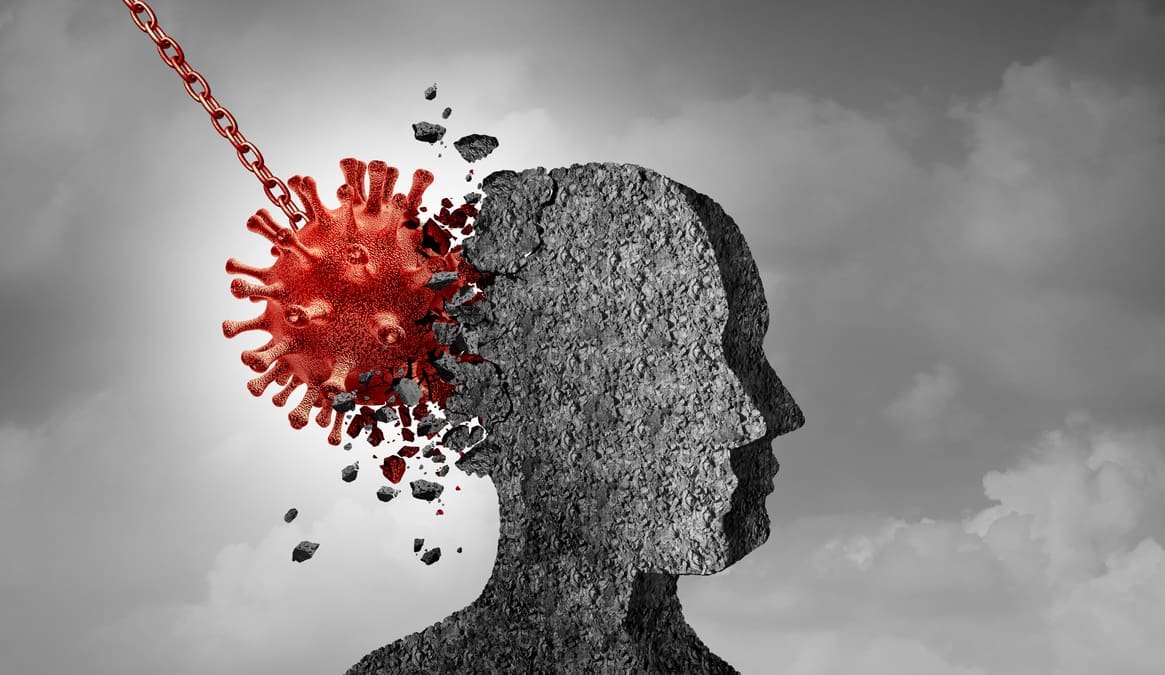The COVID-19 pandemic has likely brought many changes to how you live your life, along with uncertainty, altered daily routines, and social isolation. You may be more worried about a possible change in income, transitioning to a work from home lifestyle, and the difficulty of social distancing. You may worry about getting sick, how long the pandemic will last, whether you’ll lose your job, and what the future will bring. Information overload, rumors, and misinformation can make your life feel out of control and make it unclear what to do.
During the COVID-19 pandemic, you are more likely to experience stress, anxiety, fear, sadness and loneliness. Mental health disorders, including anxiety and depression, can worsen.
Mental health has been greatly impacted by COVID-19. Recent studies show that during the COVID-19 pandemic, people with preexisting mental health conditions have been especially more susceptible to developing moderate or severe symptoms of depression.
A Correlation Between COVID-19 and Depression
Recent studies have discovered a correlation between COVID-19, depression, and other mental illnesses. For example, The University of Oxford utilized the health records of almost 70 million participants to assess whether a diagnosis of COVID-19 (compared with other health events) was associated with increased rates of subsequent psychiatric diagnoses, and whether patients with a history of psychiatric illness are at a higher risk of being diagnosed with COVID-19. They concluded “…that nearly 1 person in 5 diagnosed with COVID-19 is diagnosed with a psychiatric disorder”. Moreover, the same study found that those who had actually contracted the virus were “twice as likely” to be diagnosed with a mental health disorder compared with someone who had the flu. Subjects who needed hospitalization for treatment were more likely to be diagnosed with a mental illness.
It is interesting to note that these findings recorded that diagnoses were made 14 to 90 days after people receive a confirmation that they have COVID-19. This study also determined that people who have previously been diagnosed with a mental illness had up to a 65% higher chance of contracting COVID-19.
Surveys show a major increase in the number of U.S. adults who report symptoms of stress, anxiety and depression during the pandemic, compared with surveys before the pandemic. Some people have increased their use of alcohol or drugs, thinking that can help them cope with their fears about the pandemic. In reality, using these substances can worsen anxiety and depression.
In a May 2020 survey, 24 % of Americans were clinically depressed. The findings suggest a huge increase from before the pandemic. For example, on one question about depressed mood, the percentage reporting such symptoms was double that found in a 2014 national survey. Young adults, women, and the economically disadvantaged especially showed higher rates of emotional instability and feelings of depression. Social support and isolation were components of this study and those who quarantined alone experienced depression at a higher rate.
Self-care strategies
Self-care strategies are good for your mental and physical health and are particularly important during challenging times like now. These include:
- Get enough sleep. Go to bed and get up at the same times each day. Stick close to your typical schedule.
- Participate in regular physical activity. Regular physical activity and exercise can help reduce anxiety and improve mood. Find an activity that includes movement, such as dance or exercise apps. Get outside in an area that makes it easy to maintain distance from people, such as a nature trail or your backyard.
- Eat healthy. Choose a well-balanced diet.
- Avoid tobacco, alcohol and drugs. If you smoke tobacco or if you vape, you’re already at higher risk of lung disease. Because COVID-19 affects the lungs, your risk increases even more.
- Relax and recharge. Set aside time for yourself. Even a few minutes of quiet time can be refreshing and help to quiet your mind and reduce anxiety. Many people benefit from practices such as deep breathing, tai chi, yoga or meditation. Soak in a bubble bath, listen to music, or read a book — whatever helps you relax.
- Make connections. If you need to stay at home and distance yourself from others, avoid social isolation. Find time each day to make virtual connections by email, texts, phone, or FaceTime.
- Support a family member or friend. If a family member or friend needs to be isolated or gets sick and needs to be quarantined at home or in the hospital, come up with ways to stay in contact.
Recognizing what’s typical and what’s not
Stress is a normal reaction to the demands of life. It’s normal to feel stress and worry during a crisis. But multiple challenges, such as the effects of the COVID-19 pandemic, can overwhelm your ability to cope.
Despite your best efforts, you may find yourself feeling helpless, sad, irritable, hopeless, anxious or afraid. You may have trouble concentrating and completing typical tasks. You may have changes in appetite, low energy, or difficulty sleeping.
When these signs and symptoms last for more than several days in a row, make you miserable and cause problems in your daily life, you should ask for professional help. For example, you can call your primary care provider or mental health professional to ask about appointment options to talk about your anxiety or depression and get treatment recommendations.
Treatment Solutions with TMS
Mid City TMS offers an effective, safe solution to treat depression and anxiety. TMS is a procedure that delivers pulses to specific areas of your brain that have low activity associated with depression. Over 75% of our patients who receive TMS treatment experience a significant reduction in their symptoms. TMS is a noninvasive treatment that improves overall mental health, especially during these difficult times.
For anyone who’s thinking, “How has COVID-19 affected you and your mental health?” you must also be wondering about how the mental health industry has adapted to meet the need for support. Fortunately, Mid City TMS has compiled some of the safety procedures this office has implemented. If you’re still unsure if this form of treatment is the best option for you, contact us today to discuss your needs and we’re happy to help!



